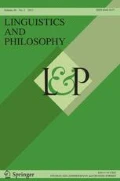Abstract
In the first section of this paper I present a well known objection to meaning holism, according to which holism is inconsistent with natural language being learnable. Then I show that the objection fails if language acquisition includes stages of partial grasp of the meaning of at least some expressions, and I argue that standard model theoretic semantics cannot fully capture such stages. In the second section the above claims are supported through a review of current research into language acquisition. Finally, in the third section it is argued that contemporary algebraic logical systems consist in a superior formal vehicle through which to capture stages of partial grasp of meaning; this claim is supported by concrete examples.
Similar content being viewed by others
REFERENCES
Barret, M.: 1995, ‘Early Lexical Development’ in P. Fletcher and B. MacWhinney (eds.), The Handbook of Child Language, Oxford: Basil Blackwell.
Becker, K.: 1998, ‘On the Perfectly General Nature of Instability in Meaning Holism’ Journal of Philosophy 95, 635–640.
Bell, J. L. and W. Demopoulos: 1996, ‘Elementary Propositions and Independence’ Notre Dame Journal of Symbolic Logic 37, 112–124.
van Benthem, J.: 1994, Modal foundations for Predicate Logic. Report No. CSLI-94-191, CSLI, Stanford.
Bilgrami, A.: 1986, ‘Meaning, Holism and Use’ in E. Lepore (ed.), Truth and Interpretation, Basil Blackwell, London.
Block, N.: 1986, ‘Advertisement for a Semantics for Psychology’ in P. French, T. Uehling and H. Wettstein (eds.), Midwest Studies in Philosophy, Vol. 10: Studies in the Philosophy of Mind, University of Minnesota Press, Minneapolis.
Bloom, L.: 1993, The Transition from Infancy to Language-Acquiring The Power of Expression, Cambridge University Press, Cambridge.
Bloom, L. and M. Lahey: 1978, Language Development and Language Disorders, Wiley, New York.
Brandom, R.: 1994, Making It Explicit, Harvard University Press, Cambridge, MA.
Cairns, H. The Acquisition of Language, Pro-Ed, Austin.
Clark, E.: 1973, ‘What's in a Word? On The Child's Acquisition of Semantics in his First Language’ in E. Moore (ed.), Cognitive Development and The Acquisition of Language, Academic Press, New York.
Davidson, D.: 1984, Inquiries into Truth and Interpretation, Clarendon, Oxford.
Davidson, D.: 1984a, ‘Reality without Reference’ in D. Davidson, Inquiries into Truth and Interpretation, Clarendon, Oxford.
Davidson, D.: 1984b, ‘Truth and Meaning’ in D. Davidson, Inquiries into Truth and Interpretation, Clarendon, Oxford.
Davidson, D.: 1984c, ‘Theories of Meaning and Learnable Language’ in D. Davidson, Inquiries into Truth and Interpretation, Clarendon, Oxford.
Dresner, E.: 1998, ‘Formal Semantics and The Algebraic View of Meaning’ Doctoral Dissertation, University of California at Berkeley.
Dresner, E.: 2000, ‘Boolean Algebra and Natural Language: A Measurement Theoretic Approach’ Nordic Journal of Philosophical Logic 4, 175–189.
Dresner, E.: 2001, ‘Tarski's Restricted Form and Neale's Quantificational Treatment of Proper Names’ Linguistics and Philosophy 24, 405–415.
Dresner, E.: 2002, ‘Measurement Theoretic Semantics and The Semantics of Necessity’ Synthese 130, 413–440.
Dresner, E.: forthcoming, ‘Wittgenstein's Builder's and Perry's Objection to Sentence Priority’ Dialectica.
Dummett, M.: 1973, Frege: Philosophy of Language, Harper and Row, New York.
Dummett, M.: 1976, ‘What is a Theory of Meaning? (II)’ in G. Evans and J. McDowell (eds.), Truth and Meaning: Essays in Semantics, pp. 67–137, Clarendon Press, Oxford.
Dummett, M.: 1991, The Logical Basis of Metaphysics, Harvard, Cambridge, MA.
Fodor, J. and E. Lepore: 1992, Holism, Blackwell, Oxford.
Givant, S. and R. MacKenzie (eds.): 1986, Alfred Tarski, Collected Papers, Birkhüuser, Basel.
Golinkoff, R., C. Mervis, and K. Hirsh-Pasek: 1994, ‘Early Object Labels: The Case for a Developmental Lexical Principles Framework’ Journal of Child Language 21, 125–156.
Henkin, L., D. Monk, and A. Tarski: 1971 (1984), Cylindric Algebras Part I (Part II), North-Holland, Amsterdam.
Henkin, L.: 1973, ‘Internal Semantics and Algebraic Logic’ in H. Leblanc (ed.), Truth, Syntax and Modality, North-Holland, Amsterdam.
Krantz, D., D. Luce, P. Suppes, and A. Tversky: 1971–1989, Foundations of Measurement (Vol. 1–3), Academic Press, New York.
Leblanc, H. (ed.): 1973, Truth, Syntax and Modality, North-Holland, Amsterdam.
Lormand, E.: 1996, ‘How to Be a Meaning Holist’. Journal of Philosophy 93, 51–73.
Markman, E. and G. Wachtel: 1988, ‘Children's Use of Mutual Exclusivity to Constrain the Meaning of Words’ Cognitive Psychology 20, 121–157.
Monk, D. and R. Bonnet (eds.): 1989, Handbook of Boolean Algebras, North-Holland, Amsterdam.
Nelson, K.: 1985, Making Sense, The Acquisition of Shared Meaning, Academic Press, Orlando.
Osherson, D., M. Stob, and S. Weinstein: 1985, Systems That Learn, MIT Press, Cambridge, MA.
Pagin, P.: 1997, ‘Is Compositionality Compatible with Holism?’ Mind and Language 12, 11–33.
Putnam, H.: 1975, ‘The Meaning of “Meaning”’ in H. Putnam, Mind Language and Reality. Philosophical Papers vol. 2, pp. 215–271, Cambridge University Press, Cambridge.
Quine, W. V.: 1960, Word and Object, MIT Press, Cambridge, MA.
Quine, W. V.: 1990, Pursuit of Truth, Harvard University Press, Cambridge, MA.
Robinson, A.: 1979, ‘Forcing in Model Theory’ in H. J. Keisler, S. Korner, W. A. J. Luxembirg, and A. D. Young (eds.), Selected Papers of Abraham Robinson, Yale University Press, New Haven.
Rosch, E., C. Mervis, W. Gray, D. Johnson, and P. Boyes-Bream: 1976, ‘Basic Objects in Natural Categories’ Cognitive Psychology 8, 382–439.
Shoenfield, J.: 1967, Mathematical Logic, Addison-Wesley, Reading, MA.
Tarski, A.: 1986, ‘A Simplified Formalization of Predicate Logic with Identity’ in S. Givant and R. MacKenzie (eds.), Alfred Tarski, Collected Papers, Birkhüuser, Basel.
de Villier, J. and P. de Villier: 1978, Language Acquisition, Harvard University Press, Cambridge, MA.
Author information
Authors and Affiliations
Rights and permissions
About this article
Cite this article
Dresner, E. Holism, Language Acquisition, and Algebraic Logic. Linguistics and Philosophy 25, 419–452 (2002). https://doi.org/10.1023/A:1020895422437
Issue Date:
DOI: https://doi.org/10.1023/A:1020895422437




